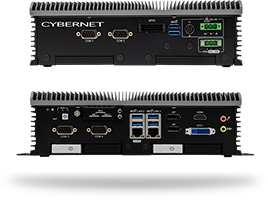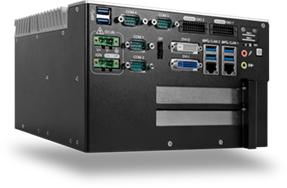The time has come to upgrade your company's computers. You've identified the need; now you just have to find the solution. But when it comes to computers, what's the right choice? In the industrial sector, two types of computers have become popular: miniature box PCs and all-in-one (AIO) PCs.
Both of these computers offer different benefits and are ideal for different roles in the industrial sector. In today's article, we'll review the strengths of both industrial box PCs and AIO PCs and offer some advice on choosing which one is right for your company.
Miniature Box PCs: Small, But Effective
Rugged mini PCs, or box PCs, are precisely what their name implies: they are computers that have been shrunk down to fit inside a small box, compact enough to be carried in one hand. These PCs combine all the functionality of a standard computer with an extremely small form factor that lets them fit into areas standard PCs cannot. They accomplish this by using CPU and RAM components typically used in laptops and relying on fanless or passive thermal management cooling solutions.
This small size means that mini PCs can fit almost anywhere, even in places that might not usually use PCs. For example, a mini PC can fit inside the cabin of a commercial vehicle or truck, giving the driver the full benefit of a computer without having to make space for it or attach it to a pre-existing rack as a rack mount PC. Because of their size, mini PCs are very light on both power requirements and upfront costs, making them much more affordable as far as computers go.
Industrial mini PCs are capable of fulfilling all the basic requirements of a computer, making them ideal for applications that require computing but don't necessarily need extraordinary performance.
All-In-One Panel PCs: Everything Needed, in One Package
An all-in-one industrial panel PC is designed to offer everything the end-user needs in a single purchase. A panel PC combines the computer and the monitor into one unit, saving both space and money. Doing so also simplifies the purchasing process; rather than having to source both a desktop PC and a monitor, an AIO brings both. Like mini PCs, AIOs use space-saving parts and design features like fanless cooling solutions to combine the monitor and computer components without taking up too much space.
Because the computer and monitor are integrated into an AIO, fewer cables need to be managed. This means less clutter and a tidier workspace. Additionally, an AIO's large monitor screen makes it perfect for anything that needs a good viewing experience, such as graphic-intensive tasks or monitoring video feeds. AIOs can also integrate peripheral accessories such as speakers and webcams, further reducing the need for other devices.
Mini or AIO Panel PC: Which One Is The Right Choice?
Both mini and AIO panel PCs are capable and reliable pieces of equipment. But every piece of equipment has a purpose and a place, and computers are no different. If you're trying to find a suitable PC for your company, you should ask these questions to help determine which choice is correct.
What are your space limitations?
Both AIOs and mini PCs help save space compared to the typical desktop and monitor arrangement, but there's no denying that minis have the advantage in this department. There are some applications where an AIO panel PC simply won't fit, such as in the cabin of a commercial vehicle. A mini PC and a smaller monitor, however, can.
Is cable management a concern?
However, one downside of using a mini PC and monitor is that they will require multiple cables for power and data. This can be a significant concern in certain applications, such as if there are moving parts or machinery nearby that the cables can get caught in. AIO computers reduce the number of cables used, which can be crucial in such environments.
What are your performance requirements?
Both mini PCs and panel PCs are suitable for general tasks such as web browsing or document editing. However, more advanced tasks like 3D graphics processing or certain programs may have greater performance requirements. In general, AIO PCs have an edge in terms of performance, but be sure to review the specs of your potential purchase closely!
Final Thoughts
While AIO panel PCs and mini box PCs certainly share some overlap in their capabilities and applications, there are enough differences between the two that it can be essential to choose one over the other. Understanding the operating environment and requirements your new purchase will face is therefore critical.
If you need further help choosing between these two options, contact the experts at Cybernet Manufacturing. Our team would be happy to further explain the differences between our AIO panel PCs and mini box PCs and help you determine which is suitable for your end-use.
Join the conversation and connect with us on this and other relevant topics - Follow us on Facebook, Twitter, and LinkedIn.


